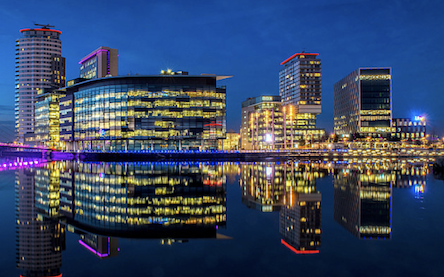Manchester and Bristol have been identified as the UK’s highest-growth cities across multiple real estate sectors over the next 10 years, according to new research by global real estate advisor, CBRE.
The firm’s latest report “Which City? Which Sector? Real estate prospects over the next decade” found the two cities were ranked in the top three for the major commercial real estate sectors – office, retail, urban logistics, and multifamily.
The report examined 12 real estate sectors across the 50 largest regional towns and cities in the UK outside of London.
To identify the top cities and sectors, the firm analysed economic drivers such as GDP, employment and income growth, demographic trends, and property market data, including supply pipeline, local universities, and housing affordability.
“Manchester is supported by its diverse industry base, thriving retail, tourism and hospitality sectors, and boasts one of Europe’s largest student populations,” said CBRE.
“It is ranked in the top five for growth in the following sectors: office, retail, urban logistics, student accommodation, multi-family housing, single family housing, affordable housing, senior living, leisure and food & beverage, self storage and life sciences.
“Bristol, meanwhile, is expecting 3.6% population growth, 5.6% employment growth and a 13% increase in office employment over the next decade. It is ranked in the top five for potential growth in office, retail, urban logistics, student accommodation, multi-family housing, single family housing, affordable housing, senior living, leisure and food & beverage, and self storage.
“A number of other cities and towns fared strongly across multiple sectors. Brighton ranked in the top ten of more than half the sectors, reflecting its strong expected employment and disposable income growth. Leeds, which has one of the most diverse economies in the UK, ranked particularly well in office (sixth) and retail (fourth).
“In Scotland, Edinburgh and Glasgow were ranked in the top five for major sectors – student accommodation, offices, and hotels. In the life sciences sector, Edinburgh is the fourth city for highest expected growth, and Glasgow sixth.”
Manchester, Birmingham, Bristol, Edinburgh, and Glasgow have been tipped as the leading growth markets for the office sector.
Manchester, Birmingham and Bristol have the highest forecast growth in office-based employment whilst Birmingham and Edinburgh are driven by highly educated talent, with Liverpool and Southampton expected to see significant growth in this area.
Supply factors are also a key consideration, and the research found that across eight of the top 10 office markets, 21.5m sq ft of office development space is due to complete before 2028, of which 5m sq ft is already under construction.
CBRE head of UK Research Jennet Siebrits said: “Future growth locations for office real estate is largely determined by demand metrics such as GDP growth, working age population, access to highly skilled workers and forecast office-based employment.
“All these fundamentals could impact office demand and subsequent size of the occupier footprint in the next decade. Meanwhile, markets with sufficient development or capacity to refurbish second-hand units will be able to capitalise as trends in ESG and design exacerbate demand for quality space.”
In retail, Birmingham, Bristol and Manchester lead the pack. Birmingham’s ranking reflects several factors, including the fourth highest expected increase in consumer spending growth, and 7.7% increase in employment over the next decade, while Bristol anticipates substantial increases in its retail floorspace per capita as well as population growth.
Unsurprisingly, given its position as the largest retail economy outside of London, Manchester is ranked third, followed by Leeds and Edinburgh.
The logistics sector has undergone a period of supply chain diversification to keep up with accelerated online retail activity and consumer expectations since the pandemic, and increased demand is being placed on smaller prime urban logistics facilities located in the UK’s major metropolitan areas. Manchester, Bristol, Sheffield, Reading and Birmingham, were ranked the highest cities respectively for projected growth.
Life sciences is expected to experience substantial growth outside of the Golden Triangle locations of Cambridge, London and Oxford, according to the research findings.
Whilst Cambridge and Oxford are ranked first and second in the report, and both cities’ future growth trajectories remain strong, Manchester (ranked third), is due to bring circa two million square foot of lab space to market by the end of the decade and Edinburgh and Birmingham are also markets to watch, said CBRE.
“The living sector has experienced rapid growth in the past decade, and this is expected to continue, with supply and demand balances, relative rental affordability and population growth being key drivers,” said CBRE.
“Manchester, Bristol and Birmingham are all ranked in the top five cities for potential growth for multi-family housing, single family housing, student accommodation, affordable housing and senior living.”
